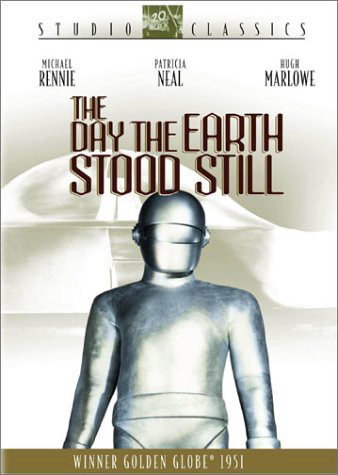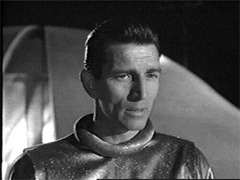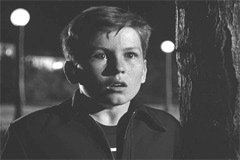The Day the Earth Stood Still: A Retro Review
11/27/2005 17:41 Filed in: Movies and Television

My brother-in-law, Clark Putman (Kathy's brother) gave me a copy of the classic 1951 sci-fi movie The Day the Earth Stood Still for my birthday this year. I saw this movie years ago as a kid, probably around the time when I was six or seven years old. Clark said it was one of his favorite movies of all time and figured I'd like it.
Well, he's right. It's a great movie--not perfect, but one that holds up pretty well over time, although it's definitely a symbol of the cold-war, flying saucer movies of the fifties. It would be impossible to name all the movies that are influenced by The Day the Earth Stood Still, but what comes to mind immediately are Independence Day, numerous Star Trek episodes and movies (especially ST:TMP and STIV), Battlestar Galactica, 2001: A Space Odyssey, The Iron Giant, and its fingerprints are even in films like Army of Darkness and Good Will Hunting. The producers chose to film most of their Washington DC scenes on location in the nation's capital rather than rely on Hollywood back lot sets--an innovation in its day, but done to add realism to the movie. To say that The Day the Earth Stood Still (from here on DESS) is a landmark film is almost understatement.
The film, directed by the recently deceased Robert Wise (The Sound of Music, Star Trek: The Motion Picture), begins with a flying saucer landing on the mall in Washington DC. Out of the saucer walks a very human looking alien, Klaatu (Michael Rennie) and a towering robot named Gort (Lock Martin). Klaatu comes in peace with a gift for the US President, but is predictably injured by a trigger-happy army soldier. Klaatu recovers and when he asks for an audience with all of the world's leaders, learns the reality of Cold War politics--the Russians won't come unless the meeting takes place in Moscow, and the Americans won't meet if the Russians are in the room. To understand the nature of earth's culture better, Klaatu escapes his army captors and assumes the role of a visitor to town, Mr. Carpenter. He soon finds a room at a boarding house where he meets a WWII widow Helen Benson and her young son, Bobby. Helen Benson is played by a young and quite striking Patricia Neal, years before she developed her trademark raspy voice, presumably from smoking. The actor playing Bobby is an extremely young Billy Gray, who would later go on to play "Bud" on Father Knows Best. Classic TV fans will also spot Francis Bavier, better known nine years later as Aunt Bea on the Andy Griffith Show, as one of the residents at the boarding house.

I'm going to break one of my review rules and tell you about part of the movie's ending, but it's core to my critique. And, hey, you've had 54 years to watch this movie, so if I'm spoiling anything for you, it's just as much your fault as mine. In shades of Star Trek: First Contact, the reason the aliens have decided to contact earth's powers is because earth has already developed atomic power for destructive use (the bombings of Hiroshima and Nagasaki) and has just begun experimenting with atomic powered rockets (according to the movie). Since earth's space exploration is inevitable, evidently there's some concern in the galactic community that earthlings will bring their violent ways to space. Space, we find out is a fairly peaceful place because years ago, the aliens submitted themselves to an inter-galactic police force represented by the giant robot, Gort. Earth is given a final ultimatum that they must either resolve their nations' violent differences and enter a new age of peace or face obliteration. Klaatu/Carpenter tells earth's leaders that he will await their answer and then the movie ends (see the quote at the beginning of the review). No doubt for 1951 audiences, the movie's ending was abrupt, and although not as surprising to today's audiences, may have been somewhat ahead of its time. There's no nice and neat resolution to this story. In effect, the decision for peace or destruction is handed over to the audience itself.

I have a couple of problems with this solution. First, giving that much power to any organization, even a representative organization like the UN, is a dangerous idea. The founders of our own nation's government knew this too well--that humans have an innate fallen disposition--which is why they created a system of checks and balances in our governmental system. Second, I realize the UN of the 1950's is quite different from the UN of today, but would we really want to answer to this organization which has been plagued by inefficiency and scandal in the last few years? Third, I have a bit of a problem with the way the decision is proposed at the end of the move. Yes, yes, I know it's a metaphor, but there's something disturbing about being "forced" into peaceful relations that bothers me. If we can't learn to live peacefully with one another from an internal change of heart, do we really want to fool ourselves into thinking we can be forced into it? I could just imagine the fictional earth of the movie choosing to submit themselves to the robot police force out of fear and then eventually plotting how to overthrow them. This is also why I don't favor christological interpretations of this movie that suggest Mr Carpenter (get it?) is a Christ figure who has come to persuade earth to pursue a better path. Long term peace cannot be forced. There must be a change of heart for peace to take place. Hate for one's neighbor has to fade away. That's a lesson the nations of the real earth still have to learn.
Regardless, this is a great movie that I absolutely recommend. The pace of DESS will seem much slower to modern movie audiences, but its real meaning is found in its dialogue rather than action sequences. The crisp black and white look of the film mixed with the story's content and genre gives it a Twilight Zone feel. The current DVD version has been produced from a restored copy of the film. Unfortunately, it's not widescreen. However, it does contain a number interviews with surviving actors and film crew, including Robert Wise before he died. Also included is an actual movie news reel from the era, that while selected because it refers to the movie itself, is more valuable for characterizing the international political landscape of the time in which the movie was made.
Klaatu Barada Nikto!









